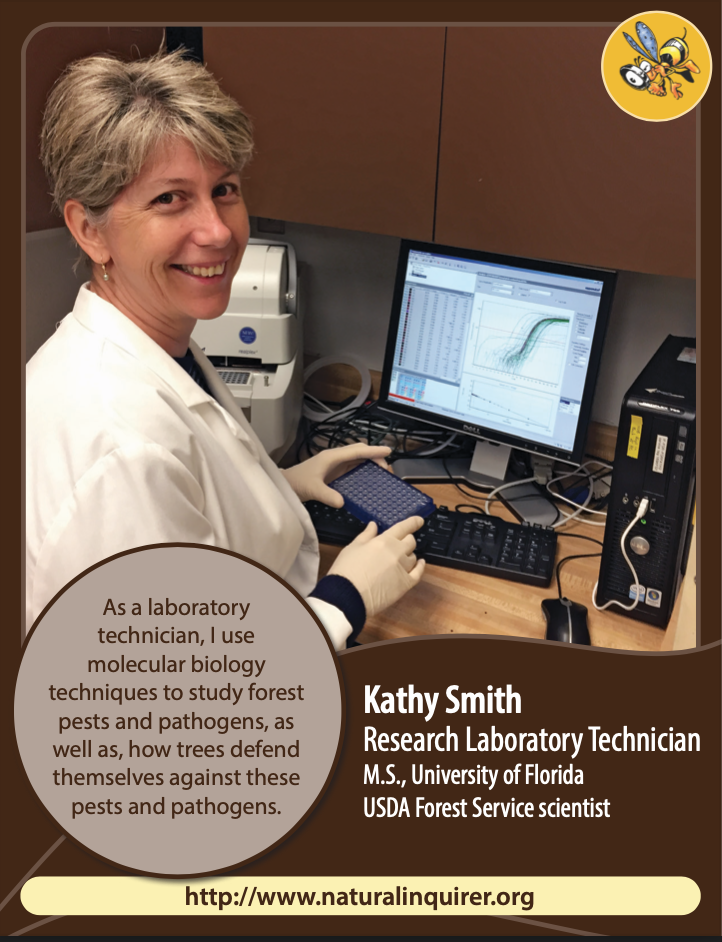Welcome to our website’s resource library, where we offer an extensive collection of free science materials tailored for K-12 students. Dive into a wealth of educational resources including articles, activities, lesson plans, learning modules, and much more. All materials are free to download!
-

 Forests & Plants
Forests & PlantsElaine Kennedy Sutherland, Dendrochronologist

- Ph.D., University of Arizona
- USDA Forest Service Scientist
- Dendrochronologists study tree rings to understand how environments have varied in the past or to determine the specific year when events occurred.
- Ph.D., University of Arizona
- USDA Forest Service Scientist
- Dendrochronologists study tree rings to understand how environments have varied in the past or to determine the specific year when events occurred.
-

 Forests & Plants
Forests & PlantsRichard Straight, Lead Agroforester & Technology Transfer

- M.S., Iowa State University
- USDA Forest Service Scientist
- I am forester who has specialized in agroforestry. My primary responsibilities are to promote agroforestry to the natural resource management community and provide them with educational materials and training.
- M.S., Iowa State University
- USDA Forest Service Scientist
- I am forester who has specialized in agroforestry. My primary responsibilities are to promote agroforestry to the natural resource management community and provide them with educational materials and training.
-

 Forests & Plants
Forests & PlantsKevin T. Smith, Plant Physiologist

- Ph.D., University of Georgia
- Forest Service Scientist
- As a plant physiologist, I study how plants and fungi capture energy, grow, protect themselves, and eventually die. I also study beneficial microorganisms in the forest.
- Ph.D., University of Georgia
- Forest Service Scientist
- As a plant physiologist, I study how plants and fungi capture energy, grow, protect themselves, and eventually die. I also study beneficial microorganisms in the forest.
-

 Forests & PlantsInsects
Forests & PlantsInsectsKathy Smith, Research Laboratory Technician

- M.S., University of Florida
- USDA Forest Service Scientist
- As a laboratory technician, I use molecular biology techniques to study forest pests and pathogens, as well as, how trees defend themselves against these pests and pathogens.
- M.S., University of Florida
- USDA Forest Service Scientist
- As a laboratory technician, I use molecular biology techniques to study forest pests and pathogens, as well as, how trees defend themselves against these pests and pathogens.
-

 Forests & Plants
Forests & PlantsNick Skowronski, Forest Ecologist

- Ph.D., Rutgers University
- USDA Forest Service Scientist
- A forest ecologist studies how plants and animals interact within a forest community. Some of these scientists are particularly interested in how forests cycle carbon and work to measure how carbon moves through these systems.
- Ph.D., Rutgers University
- USDA Forest Service Scientist
- A forest ecologist studies how plants and animals interact within a forest community. Some of these scientists are particularly interested in how forests cycle carbon and work to measure how carbon moves through these systems.
-

 Forests & Plants
Forests & PlantsCallie Schweitzer, Research Forester

- Ph.D., Penn State University
- USDA Forest Service Scientist
- A research forester studies how forests respond to disturbances. I am interested in trying to predict how trees grow, which tree species grow best, and how both plants and animals respond to events such as fire, drought, timber harvesting, and people!
- Ph.D., Penn State University
- USDA Forest Service Scientist
- A research forester studies how forests respond to disturbances. I am interested in trying to predict how trees grow, which tree species grow best, and how both plants and animals respond to events such as fire, drought, timber harvesting, and people!
-

 Forests & PlantsWildlife
Forests & PlantsWildlifeMichael Schwartz, Conservation Geneticist

- Ph.D., University of Montana
- USDA Forest Service Scientist
- A conservation geneticist examines the DNA found in cells of every species to learn many secretive facts about these species.
- Ph.D., University of Montana
- USDA Forest Service Scientist
- A conservation geneticist examines the DNA found in cells of every species to learn many secretive facts about these species.
-

 Forests & Plants
Forests & PlantsPaul Schaberg, Research Plant Physiologist

- Ph.D., University of Vermont
- USDA Forest Service Scientist
- A plant physiologist studies the biology of how plants work. These studies are often done to determine if a part of a plant is not working or is causing the plant problems. An example includes low air temperatures causing injury and poor growth.
- Ph.D., University of Vermont
- USDA Forest Service Scientist
- A plant physiologist studies the biology of how plants work. These studies are often done to determine if a part of a plant is not working or is causing the plant problems. An example includes low air temperatures causing injury and poor growth.
-

 Forests & Plants
Forests & PlantsLindsey Rustad, Forest Ecologist

- Ph.D., University of Maine
- USDA Forest Service Scientist
- A forest ecologist studies the interrelated patterns and processes of vegetation, animals, energy, water and nutrients in forests.
- Ph.D., University of Maine
- USDA Forest Service Scientist
- A forest ecologist studies the interrelated patterns and processes of vegetation, animals, energy, water and nutrients in forests.
-

 Forests & PlantsWildlife
Forests & PlantsWildlifeAlejandro Royo, Ecologist

- Ph.D., University of Pittsurgh
- USDA Forest Service Scientist
- Ecologists study how interactions among organisms within communities and environmental factors influence the diversity, distribution, and dynamics of species.
- Ph.D., University of Pittsurgh
- USDA Forest Service Scientist
- Ecologists study how interactions among organisms within communities and environmental factors influence the diversity, distribution, and dynamics of species.



